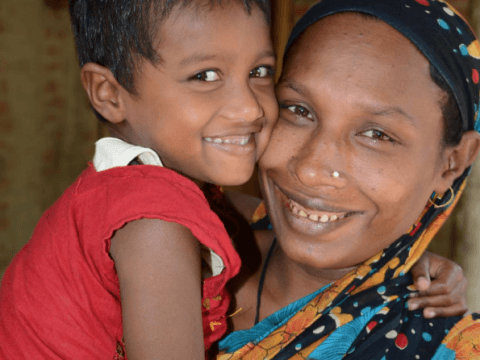Annual Report 2012
Download
Fiscal Year 2013 was a crucial year for World Vision Bangladesh’s (WVB) development process and progress. The organization carried out decisive strides complementing the government’s Millennium Development Goals (MDGs) by its range of programmatic interventions. Through its partnership with the local community, government, NGOs, and Community Based Organizations (CBOs), WVB achieved much in the areas of poverty reduction, improvement of maternal and child health, nutrition, disaster resilience, quality education, and child protection.
In the area of improving the health status of mothers and children, WVB works towards reducing maternal and child mortality by improving the health and nutritional status of children under five and pregnant and lactating mothers, along with adolescent girls. During the fiscal year 2013, WV served 1,442,596 people under its primary and public health services. These programs focused on primary health, nutrition education, and behavioral change at the household level to empower caregivers and children in keeping themselves healthy. Apart from regular programs the organization is implementing the Direct Nutrition Intervention project in Bhaluka and Khulna with financial and technical support from UNICEF.
Building a resilient community is at the core of all activities for Humanitarian and Emergency Affairs and Climate Change Adaptation both in urban and rural settings. Showcasing the progress for FY 2013 in the area respond to disasters and the impact of climate change a total of 410,118 people in the community benefitted through disaster relief, rehabilitation, and environment preservation programs.
In creating economic opportunities for the poor, WVB operates a number of farm and non-farm interventions through its Economic and Agriculture Development Program. WVB created business development opportunities, for women in particular, by providing necessary support to non-farm micro-enterprises including handicrafts, bamboo products, tailoring, food processing, and carpentry. In FY 2013, WVB served 191,270 program participants, including women (75%) and people with disabilities, under its agriculture, fisheries, and livestock interventions. The organization also promoted new technologies and practices which are resilient to climate change such as adaptation of drought and salinity tolerant crops, organic gardening and integrated crop management.
With the view of ensuring improved access and quality of education, the organization placed emphasis on the cognitive development of students, upgrading the skills of school management committees, and providing non-formal education to drop-out children. WVB served 739,000 students and youths under its education intervention programs in FY-2013. The organization also put emphasis on the disadvantaged working children through its “Children in Extremely Difficult Circumstances (CEDC)” program. Children getting assitance from WVB scored excellent results in public examinations i.e. Secondary School Certificate (SSC) and Higher Secondary Certificate (HSC) which is significantly better than the national average.
To ensure that children are protected and cared for, WVB formed 639 child forums, composed of more than 46,000 members that included 23,000 girls. These forums provided opportunity for the children to learn and reflect together about their rights, educational development, and future aspirations for democratic leadership. In some areas, they work jointly with WVB, community-based organizations (CBOs) and law enforcement agencies to stop early marriage and child labor, among other rights-based issues. WVB also initiated special drives on child protection, through its ‘Child Safety Net’ and ‘Notun Jiboner Asha (Hope for New Life)’ projects, to combat trafficking and child labour.
Advocacy became a valuable tool for WVB in FY-2013 in promoting justice for women and children. In addition to building significant networks with the government, and local, national and global platforms, WVB focused on several policy reviews. Significant number of campaigns such as Child Marriage, Child Health Now, Violence Against Children, and Child Trafficking received media highlights. During FY 2013, three child advocates represented the organization in global forums, including sessions at the United Nations Assembly in the United States of America.
WVB facilitated Community-Based Organizations’ (CBOs) efforts in ensuring women leadership, empowerment, and contribution towards child wellbeing aspirations. It also created opportunities for income generation at individual and organizational level through training, credit support, enterprise development, market linkage, export, and women market. In FY 2013, WVB assisted 227,247 people in the community that included 90% female representatives under 553 CBOs. These CBOs are handling more than USD 120 million (around Taka 96 crore) on a monthly basis. Success of these CBOs were demonstrated by the following: 56% CBOs were able to run independently; 19% CBOs received best awards at district and upazila levels; and a number of members were selected as Union Parishad (local government) members in FY-2013.